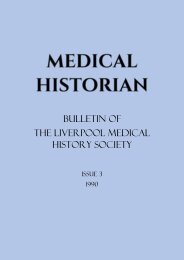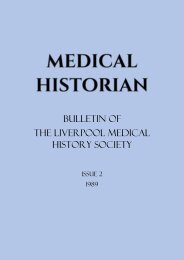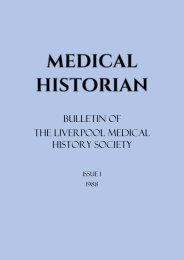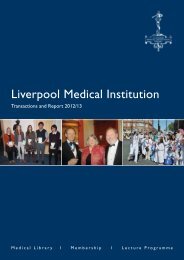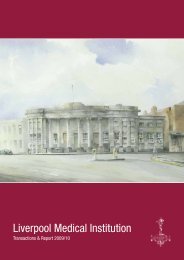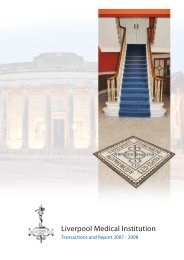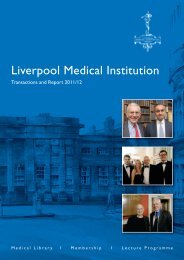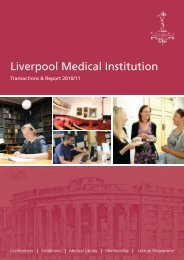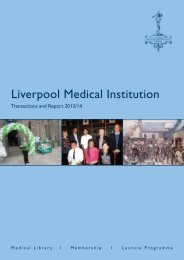LMITransactions&Report2014-15
Create successful ePaper yourself
Turn your PDF publications into a flip-book with our unique Google optimized e-Paper software.
LMI Transactions and Report 2014 - 20<strong>15</strong><br />
Minutes of the Second Ordinary Meeting<br />
Held on Tuesday 18th November 2014<br />
Joint Meeting with Liverpool Medical History Society<br />
The Tenth Annual History of Medicine Medical Students’ Prize Evening<br />
Back (left to right): Dr Nick Beeching, Mr Max McCormick, Dr Stephen Kenny, and Dr Christopher Evans<br />
Middle (left to right): Shane D’Souza, Alexander Boone,<br />
Professor Sally Sheard, Dr Susan Evans and Dr Peter Dangerfield<br />
Front (left to right): Kitty Worthing, Siân Elsby and Sophie Gealy-Evans<br />
Kitty Worthing - Winner<br />
‘Crazy to be sane - whatever happened to RD Laing?’<br />
R D Laing was a well-known figure in the 1960s both<br />
in the medical community and amongst sections of the<br />
wider public. He became an important, and for a<br />
while, influential figure in redefining and treating<br />
mental illness - in particular Schizophrenia. However<br />
his ideas and influence were apparently short-lived.<br />
Given criticisms of the style of psychiatric diagnosis<br />
currently employed, this presentation examines<br />
different historical constructions of mental illness and<br />
how it is treated. Opposition to psychiatry has taken<br />
many forms, all of which could not be covered by this<br />
presentation. Therefore I have chosen to focus on<br />
outlining the ideas of RD Laing and the 'antipsychiatry<br />
movement' and to consider the<br />
contribution that he, and they, made to the<br />
understanding and treatment of mental illness. Firstly<br />
I will reflect upon the attitudes and treatments<br />
prevalent in the 1950s and ‘60s and the critique of<br />
these made by Laing and others. I will then examine<br />
some of the possible reasons for the backlash against<br />
Laing and his ideas before finally looking at the extent<br />
to which Laing's ideas are in fact an influence on<br />
modern day attitudes to defining and treating mental<br />
illness - an influence which it argues can be seen in,<br />
for ex<strong>amp</strong>le, the 'user movement' and in the<br />
popularity of 'self-help' groups. I will conclude that<br />
although much of Laing's work lacked scientific<br />
validity, his contribution to making 'madness'<br />
comprehensible and encouraging people to consider<br />
mental illness from an empathic and humanistic point<br />
of view is of great value to contemporary medical<br />
practice and wider society. It also highlights that there<br />
is a lack of historical analysis concerning the antipsychiatry<br />
movement; especially in regards to its<br />
demise.<br />
Shane D'Souza - Second Place<br />
‘Gertrude Elion and Her Drug Discoveries’<br />
Gertrude Elion made significant discoveries of drugs<br />
in the treatment of leukaemia, herpes and antirejection<br />
drugs for kidney transplants. Her hard work,<br />
commitment and attitude led to revolutionary<br />
20



